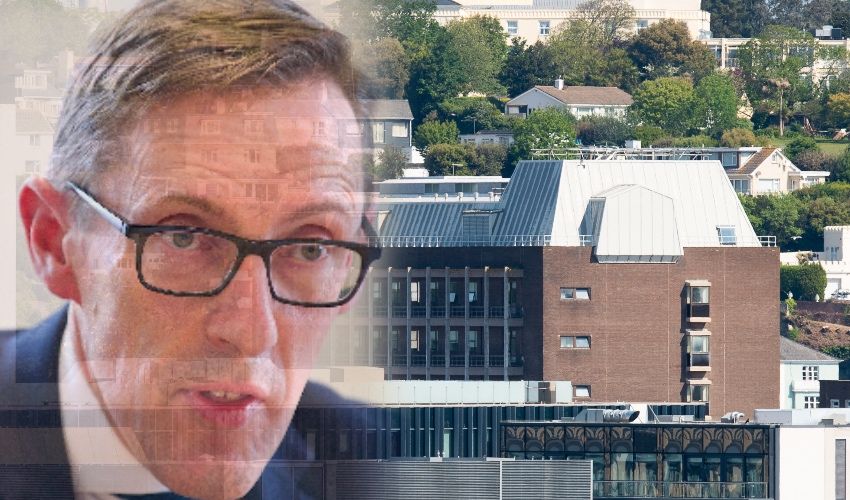


Health leaders have been “read the Riot Act” by the Minister with his hands on the island’s purse strings over failures to keep the department within budget – with a demand to reduce spending by £25m per year by 2025.
But, despite the ultimatum from Treasury Minister Ian Gorst, the draft Government Plan released this week proposes a 15% hike in health funding from £249m this year to £287m next.
In addition to inflation allocations totalling £70m for all departmental budgets, a further £8m a year has been provided to maintain health and community care standards.
An assessment of Health and Community Services spending also identified a £15m structural deficit in the financing of the department. The plan covers that legacy underfunding and a further £6m in 2024 to support the “financial turnaround”.
Pictured: “I have written to both the previous and current CEOs of Health and read them the Riot Act," said Treasury Minister Ian Gorst.
As part of this turnaround, a ‘Financial Recovery Plan’ for the department has been developed and will deliver £10m of savings next year and £25m in efficiencies per year by 2025.
The plan says that these saving will bring departmental spending back into line with budgeted approvals, after “structural gaps” in the departmental budget have been remedied.
The Treasury Minister had already set the department the challenge of living within its means and told them not to ask for more money earlier this year after a £13.3m emergency bung was required to deal with what leaders described as “unavoidable pressures” – “pressures” which partially arose due to missing a £6.5m savings target.
The Health department is, however, still on track to significantly overspend this year.
Around the same time, campaigners called for an audit of the senior leadership structure in Health after it emerged that the annual bill for managers stood at £10.1m having shot up by more than £3.5m since 2019.
This week, Deputy Gorst told Express that it was imperative that Health delivered its savings to provide him, and islanders, with confidence that the department was in control of its spending.

Pictured: The Health and Community Services budget is £287m next year.
He said: “There is a school of thought that says when Health spend was controlled by the accountants in Health, they’d simply manage their budget, within budget.
“We don't live in that world anymore. We accountants are told we know the price of everything and the value of nothing.
"We live in a world where it's right that people expect a good quality healthcare system, and drugs and procedures are always improving. And that's how we need to think about Health spend.”
Deputy Gorst said he had communicated his thoughts to department’s previous leader Director General Caroline Landon, who departed abruptly earlier this year.
He said the expectation was the same for interim Chief Officer Chris Bown.
“I have written to both the previous and current CEOs of Health and read them the Riot Act, which they’re not necessarily happy about, and I've met with the financial turnaround team and said the same to them.
“So, I do believe that they are working in the right direction. Part of their plan is £25m efficiency savings, so it could be £25m worse. That's what they found but they're saying over the course of the next couple of years, they can solve that.

Pictured: Chris Bown was appointed Interim Chief Officer of Health and Community services on a 12-month fixed-term contract after the sudden departure of Caroline Landon.
“But if I'm absolutely honest, I will only have the certainty that they are getting it under control, if they deliver the £3m saving that they've said they will by the end of this year.
“So, they're still going to be overspent massively in 2023, by around £25m. I've given them lots of money this year, including an extra £5m [to get waiting lists down]. Only this month, they told me, they would make a saving of £3m this year. And until I see that saving, I won’t have the confidence that islanders would expect of me.”
The Financial Recovery Plan is a set of proposals due to be finalised this autumn which will enable Health to make savings so that key services struggling with inflationary pressure can be maintained – examples include mental health placements, social care packages, high-cost drugs, off-island care, expansion beds and cancer services.
"The recovery plan is identifying opportunities for improved efficiency and effectiveness of services to help reduce costs and increase income to ensure that the service can be delivered within the revised cash limits – reducing spend by £25m a year by 2025," an annex to the draft Government Plan explains.
"The Council of Ministers have recognised that the delivery of these savings will take time, and it is anticipated that not all structural elements can be resolved without impacting healthcare services and patients," the report adds.
Comments
Comments on this story express the views of the commentator only, not Bailiwick Publishing. We are unable to guarantee the accuracy of any of those comments.